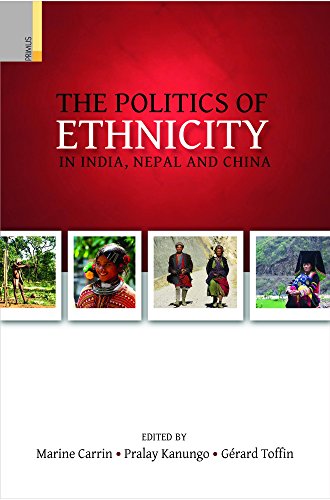Articoli correlati a Politics of Ethnicity in India, Nepal and China

Le informazioni nella sezione "Riassunto" possono far riferimento a edizioni diverse di questo titolo.
- EditorePrimus Books
- Data di pubblicazione2014
- ISBN 10 9380607873
- ISBN 13 9789380607870
- RilegaturaCopertina rigida
- Numero di pagine343
- RedattoreCarrin Marine, Kanungo Pralay, Toffin Gerard
Compra nuovo
Scopri di pił su questo articolo
Spese di spedizione:
EUR 3,72
In U.S.A.
I migliori risultati di ricerca su AbeBooks
Politics of Ethnicity in India, Nepal and China
Descrizione libro Condizione: New. pp. 352 Index. Codice articolo 2650996983
Politics of Ethnicity in India, Nepal and China
Print on DemandDescrizione libro Condizione: New. pp. 352 This item is printed on demand. Codice articolo 58562856
THE POLITICS OF ETHNICITY IN INDIA,NEPAL AND CHINA (Hard Cover)
Descrizione libro Hardcover. Condizione: New. Codice articolo 1965790
The Politics of Ethnicity in India, Nepal and China
Descrizione libro Hardcover. Condizione: New. Condizione sovraccoperta: New. 1st Edition. The Politics of Ethnicity in India, Nepal and China critically reflects on the social, cultural and political processes that have shaped these societies since the 1950s. By and large, ethnic minorities have emerged as powerful groups in the internal politics in most parts of South Asia and the Far East. In an attempt to partly accommodate the political and economic aspirations of some of these ethnic groups, in India, the authorities have created smaller states on the basis of language, culture, and in some cases economic backwardness. The Indian Union has formed autonomous district councils, paving the way (in Jammu and Kashmir, Nagaland and Mizoram) for an asymmetrical form of federalism where special powers are devolved to local units. In Nepal, ethnic minorities include economically and culturally diverse groups scattered over the country. Inspired by the Indian experiment, the political elite in Nepal is now seeking to institutionalize procedures to fully integrate the adivasis/janajatis as citizens. While India and Nepal largely recognize the emergence of these ethnic minorities as political actors, the Chinese state, ignoring the political demands of its minorities, is focussing on their economic development and their modernization. Codice articolo 112592

